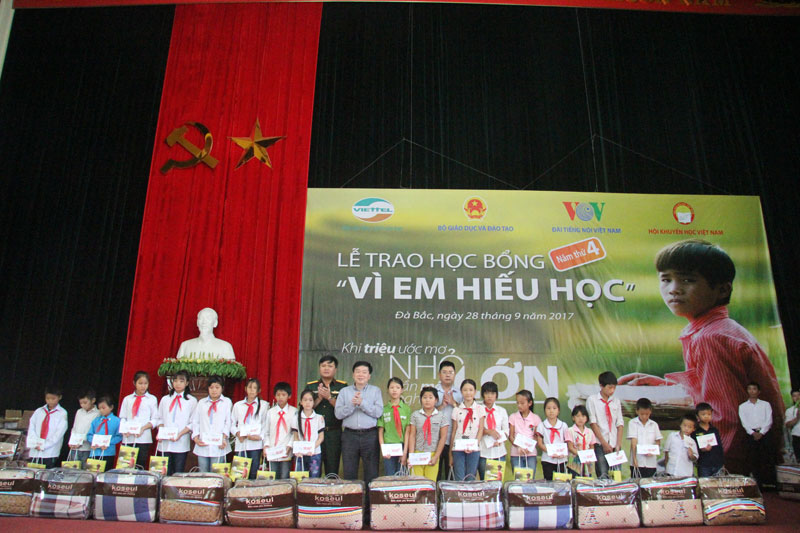
(HBO) – The Hoa Binh branch of the military-run telecommunication company Viettel Group on September 29 presented 170 scholarship from the programme "For Studious Children” to 170 needy students in 17 extremely poor communes in Da Bac district of Hoa Binh. Each scholarship was valued at 1 million VND, including 500,000 VND in cash and 500,000 VND worth in kind. Nguyen Van Chuong, Vice Chairman of the provincial People’s Committee attended the event.
The
scholarships were part of a programme to offer 990 scholarships worth 990
million VND launched by Viettel Hoa Binh targeting 99 communes in 10 districts
of Hoa Binh. In 2017, the programme will present the scholarships to 10 poor
children with good academic performance in each commune.
The
"For Studious Children” programme of Viettel Hoa Binh has been implemented with
the coordination of the Hoa Binh Department of Education and Training, the Hoa
Binh Fund for Study Encouragement. 2017 is the fourth year it has been carried
out in Hoa Binh (2014-2017).
Viettel
Hoa Binh has presented 3,840 scholarships valued at 3.84 billion VND to local
students as part of its commitment to support poor children in the province in 10
years until 2020 with total aid of nearly 10 billion VND.

Vice Chairman of the provincial People’s Committee Nguyen
Van Chuong presents "For Studious Children” scholarships to students in Da Bac
district.
Along
with presenting scholarships, Viettel Hoa Binh will continue conducting other
programmes such as bringing broad-band Internet connection to all schools and
educational facilities in the province, along with solutions and applications
as comprehensive management tools for schools and training establishments.

Leaders of the province, local departments and
localities as well as Viettel Hoa Binh representatives give presents to
students of Da Bac district.
According
to a representative from Viettel Hoa Binh, through the "For Studious Students”
programme, the firm affirms its business philosophy of upholding social
responsibility and its policy of "investing in education means investing in the
country’s future”.
Hoa Binh province is undergoing a dynamic transformation amid Vietnam’s national digital transition. Building on Poliburo’s Resolution No. 57-NQ/TW on breakthroughs in science, technology, innovation, and national digital transformation, the province has rolled out a wide range of practical action plans. A standout initiative is the "Digital Literacy for All” movement, an effort to ensure that no one is left behind in the digital era.
Hoa Binh province is undergoing a dynamic transformation in the wake of the national digital transformation movement. Building on Resolution No. 57-NQ/TW of the Politburo on breakthroughs in science, technology, innovation, and national digital transformation, the province has implemented a wide range of practical action plans. A standout initiative is the "Digital Literacy for All” movement ambitious effort to ensure that no one is left behind in the digital age.
With a spirit of unity and proactive problem-solving, the Party Committee, the government and the people of Dong Lai Commune (Tan Lac District) have made great strides in implementing the resolutions of the 24th Party Congress of the commune for the 2020 - 2025 term. Focusing on leadership and practical actions, the commune has brought the Party’s resolutions into daily life, creating strong impacts and pushing the local development forward.
Amid the nationwide push for digital transformation, young people in Hoa Binh Province are stepping up as dynamic pioneers, applying technology to enhance Youth Union operations and expand the reach of youth-led initiatives. Through creativity and adaptability, Youth Union organizations at all levels have introduced a series of practical solutions, contributing to modern governance and community development.
In recent years, An Nghia commune, located in Lac Son district, has stepped up administrative reform, focusing on improving the quality and efficiency of its single-window service unit for receiving and processing administrative procedures. These improvements have helped create favourable conditions for local residents and organisations to handle administrative procedures, contributing to the commune’s broader socio-economic development.
The Prime Minister-approved master plan to develop the multi-use value of forests ecosystems through 2030, with a vision to 2050, aims to improve the management and sustainable use of forest resources, create jobs, increase incomes, and improve the living standards of ethnic minorities, people in mountainous and remote areas, forest workers and those living near forests.




